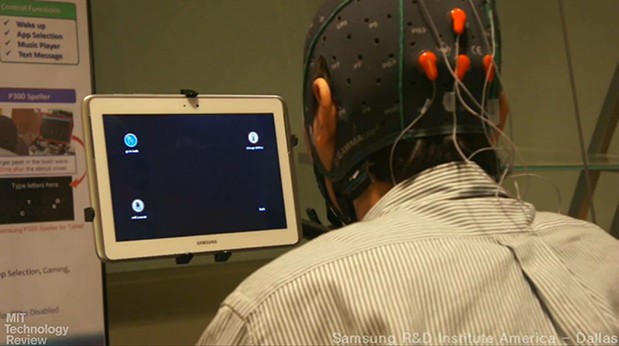Samsung Wraps Head Around Brain-controlled Tablets
Samsung takes a stab at mind control for tablets and smartphones. Study shows significant results but is still years away from the commercialization goal.
Get Tom's Hardware's best news and in-depth reviews, straight to your inbox.
You are now subscribed
Your newsletter sign-up was successful
The world of alternative input methods is becoming increasingly interesting with the development and technology of eye tracking, gestures, and even mind control. However, Samsung is determined to outsmart everyone, as it has now formed a coalition with the University of Texas to develop mind controllers for your tablets and smartphones.
The company and the university put their thinking caps on and came up with EEG-based controllers. The technology is based on an existent technique called EEG (electroencephalography, often seen in hospitals), which maps the mind's electrical pathways by measuring voltage changes caused by neurons firing. The difficult part here is to link a single cluster of pathways to a specific idea that involves a very advanced software platform and a huge amount of practical and field data.
Surprisingly, the company already has had very high success rates from their experiments, with up to 95 percent of users being able to make a selection on a screen every five seconds by using only their brains. Samsung is aiming at commercializing this type of input method, but not until after a couple more years of everything from improved effectiveness to aesthetic design, as well as the customary hoard of patents thrown in. For those interested, read more about ongoing developments here.
Get Tom's Hardware's best news and in-depth reviews, straight to your inbox.
Tom's Hardware is the leading destination for hardcore computer enthusiasts. We cover everything from processors to 3D printers, single-board computers, SSDs and high-end gaming rigs, empowering readers to make the most of the tech they love, keep up on the latest developments and buy the right gear. Our staff has more than 100 years of combined experience covering news, solving tech problems and reviewing components and systems.
-
drwho1 it would take 20 seconds to type a 4 letter word....Reply
/sarcasm
obviously this is a long way from been an actual product that people would be interested in. -
InvalidError Reply
But the possibilities are almost endless.10728831 said:obviously this is a long way from been an actual product that people would be interested in.
Imagine office or IDE environments where the software formats and fills boilerplate stuff based on thoughts from the back of your mind as you think about the "big picture"... by the time you are done thinking and are ready to get to work, half of it if not more is already done.
Of course, that degree of brain-to-computer interface would likely require implant chips - an external harness would likely lack the bandwidth, SNR, resolution and interface point count to achieve it.
It will probably take 30-50 years to get there.

